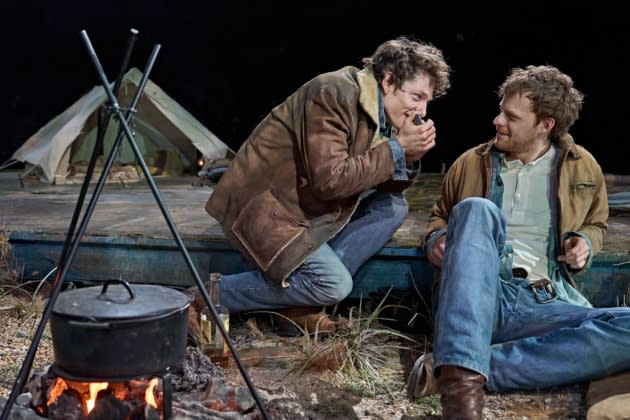‘Brokeback Mountain’ Review: Well-Acted and Well-Meaning Play Version Doesn’t Make for Compelling Theater
- Oops!Something went wrong.Please try again later.
- Oops!Something went wrong.Please try again later.
- Oops!Something went wrong.Please try again later.
- Oops!Something went wrong.Please try again later.
- Oops!Something went wrong.Please try again later.
- Oops!Something went wrong.Please try again later.
- Oops!Something went wrong.Please try again later.

Canny casting of Mike Faist (“West Side Story”) and Lucas Hedges (“Manchester by the Sea”) and abundant efforts to honor Annie Proulx’s short story “Brokeback Mountain,” immortalized in Ang Lee’s screen version, are all in place. Above all, the sincerity underpinning director Jonathan Butterell’s premiere of a stage version is never in doubt. But despite a live soundtrack of bluegrass and country songs, the production only proves you can have too much fidelity. Sticking so doggedly to the original, the production fails to find anything approaching a satisfying theatrical form.
Staged in-the-round in London’s 602-seat Soho Place theater, Ashley Robinson’s notably sparse adaptation of Proulx’s story confuses literary with literal. Borrowing the story’s introductory paragraphs, Robinson provides a cliched framing device, showing the older version of Ennis (Paul Hickey) waking up besieged by difficult memories. From his bedside radio, we hear the first of Dan Gillespie Sells’ original country songs welling up. The pedal steel guitar sets the scene, but its title and chorus “Don’t Let the Years Get You Down” is an immediately worrying indication that the production will be telling as well as showing.
More from Variety
'Brokeback Mountain' Sets West End Adaptation, With Mike Faist and Lucas Hedges to Star
Larry McMurtry, Oscar Winner for 'Brokeback Mountain' and Author of 'Lonesome Dove,' Dies at 84
That’s precisely what happens as everything proceeds with unvarying rhythm through the story’s staging posts, from the hiring of the two young men, tactiturn Ennis (Hedges) and talkative Jack (Faist), through the beginning and flowering of their secret relationship, to their marriages and the tragic conclusion.
Theatricality is attempted in two ways. The live, accompanying soundtrack of 13 songs, soulfully sung not by the actors but by Scots singer Eddi Reader, is there to create the mood so vividly captured by the film’s cinematography. But evocative though the music of the easeful four-piece band (especially Greg Miller’s harmonica-playing) is, the songwriting is unmemorable as it tips over from initially atmospheric into generic.
Both that and the near-permanent presence of watchful, almost older Ennis silently emoting at the edge of the scenes has the opposite effect to that intended. Making the painful subtext and the action’s emotional effect so overt actually closes down individual responses to the characters’ plight. Being told how to feel precludes feeling.
Robinson’s script uses snatches of salty, clipped dialogue exchanges from the story, as when Ennis talks about having shot a coyote: “Balls on him size o’ apples,” Ennis says before offering Jack hot water to clean himself. Turned down, he shrugs, “Well, I’m goin a warsh everthing I can reach.”
But where the dialogue of story and screenplay were filled out with respectively, authorial voice and close-ups allowing everyone to read the emotions, this stage version leaves the stranded actors nothing with which to replace either device. When characters express themselves in extended dialogue, everything goes up a gear. But those moments are rare and occur too late in the story.
The rest of the writing is merely functional, as in the scene where Ennis’ long-suffering wife Alma (nicely tired Emily Fairn) curls up on her bed, drowning in the knowledge of her husband’s secret life. Ennis returns home, looks at her, drops his bag and, assuming her to be asleep, sits gently on the edge of the bed. “I want a divorce,” says Alma, the scene’s sole line. He leaves. On screen that could work but on stage without close-up and with faces hidden by in-the-round staging, the audience remains unmoved because the writing is too schematic to let anyone into the depth of the pain.
Both ideally rangy, the committed leads throw themselves at their roles. Strong, sparky, bright-eyed Faist fares better, because wooing Jack ask questions and proffers information to fill silences. In contrast, Hedges, through no fault of his own, suffers because of Ennis’ withholding nature. He is evidently deeply troubled but only late into the story where rage overtakes him does he get to express himself in any way other than physically.
They consummate their passion in the tent, seen only in silhouette, but even that comes as an odd surprise because the lack of close-up or theatrically layered dialogue robs us of being able to feel the rising sexual tension. Thus their lovemaking the next morning, with the two actors shirtless and devouring each other up, lacks convincing charge between them because we haven’t been given the chance to fully engage with them.
That’s made plainest when the men re-meet for the first time. Heading outside and away from prying eyes, the two men check it’s safe — the gayest moment in the film — and then lunge at each other in a kiss of desperate love… unaware that Alma is watching. Here, Alma goes to follow the men across Tom Pye’s open set. Seeing them kissing, she stops short. The audience may feel her pain, but on press night, the moment was met not with horror but with laughter.
The idea of lives wrecked by rampant homophobia remains sadly and horribly current. But any emotions this production engenders around the topic are more likely earned by the audience’s memories of the source material rather than from the well-intentioned work on the stage.
Best of Variety
Sign up for Variety’s Newsletter. For the latest news, follow us on Facebook, Twitter, and Instagram.
